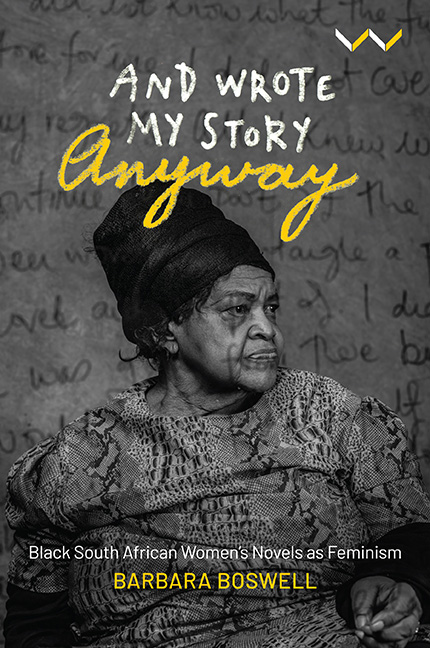Book contents
- Frontmatter
- Dedication
- Contents
- Acknowledgements
- Author's Preface
- Acronyms
- Introduction: ‘And Wrote My Story Anyway’: Black South African Women's Novels as Feminism
- 1 Writing as Activism: A History of Black South African Women's Writing
- 2 Rewriting the Apartheid Nation: Miriam Tlali and Lauretta Ngcobo
- 3 Dissenting Daughters: Girlhood and Nation in the Fiction of Farida Karodia and Agnes Sam
- 4 Interrogating ‘Truth’ in the Post-Apartheid Nation: Zoë Wicomb and Sindiwe Magona
- 5 Making Personhood: Remaking History in Yvette Christiansë and Rayda Jacobs's Neo-Slave Narratives
- 6 Black Women Writing ‘New’ South African Masculinities: Kagiso Lesego Molope and Zukiswa Wanner
- Conclusion: Towards a Black South African Feminist Criticism
- Select Bibliography
- Index
Introduction: ‘And Wrote My Story Anyway’: Black South African Women's Novels as Feminism
Published online by Cambridge University Press: 15 June 2021
- Frontmatter
- Dedication
- Contents
- Acknowledgements
- Author's Preface
- Acronyms
- Introduction: ‘And Wrote My Story Anyway’: Black South African Women's Novels as Feminism
- 1 Writing as Activism: A History of Black South African Women's Writing
- 2 Rewriting the Apartheid Nation: Miriam Tlali and Lauretta Ngcobo
- 3 Dissenting Daughters: Girlhood and Nation in the Fiction of Farida Karodia and Agnes Sam
- 4 Interrogating ‘Truth’ in the Post-Apartheid Nation: Zoë Wicomb and Sindiwe Magona
- 5 Making Personhood: Remaking History in Yvette Christiansë and Rayda Jacobs's Neo-Slave Narratives
- 6 Black Women Writing ‘New’ South African Masculinities: Kagiso Lesego Molope and Zukiswa Wanner
- Conclusion: Towards a Black South African Feminist Criticism
- Select Bibliography
- Index
Summary
Black women have always been involved in the creation and performance of our literature, especially oral literature … We have been writing for a long time; it is now that these writings are beginning to come out in the open.
Lauretta Ngcobo — Let It Be ToldWhat are the uses of feminist literature and theory? What possibilities for knowing and understanding ourselves might feminist literary theory offer the postcolonial, post-apartheid subject? More than 20 years after the transition to democracy in South Africa, power and dominance have seemingly shifted, yet have reformulated themselves along racial configurations strikingly similar to those produced by the apartheid state. For those who are economically abjected by local and global structures shaped by a neoliberal global world order, can theory offer liberatory ways of seeing, or transgressive modes of engaging with, and being in, the world? In a social order where the majority of citizens have found the fulfilment of basic human and socioeconomic rights receding almost beyond reach, are we justified in looking towards texts – fiction, theory, criticism – for signposts towards achieving fully actualised, dignified lives for those for whom 1994 meant the deferment of freedom?
And Wrote My Story Anyway: Black South African Women's Novels as Feminism takes, as a point of departure, the fundamental power of stories to shape and transform lives. It asks what we can learn from the literary output of those most negatively impacted by colonialism and apartheid – black women – if we consider their writing as a set of theories that produce a praxis towards a more just social order. Literature has the capacity to remake worlds and to imagine alternatives to ‘what is’: political and social orders that oppress, and which limit freedom. Black South African women historically wrote fiction as a way of fighting the gross inhumanity of the apartheid system, creating a canon that, as its foundational preoccupation, interrogated power in its most brute forms. It is within this tradition that post-apartheid black women's writing situates itself.
Consequently, this book examines the novels of black South African women writers during and after apartheid as a site of theory production: each novel is not only a set of literary narrations, with its own aesthetic, but also a political blueprint that enables us to ask critical questions of the nation, and to analyse the intersectional nature of black women's locations within apartheid and democratic South Africa.
- Type
- Chapter
- Information
- And Wrote My Story AnywayBlack South African Women's Novels as Feminism, pp. 1 - 26Publisher: Wits University PressPrint publication year: 2021



